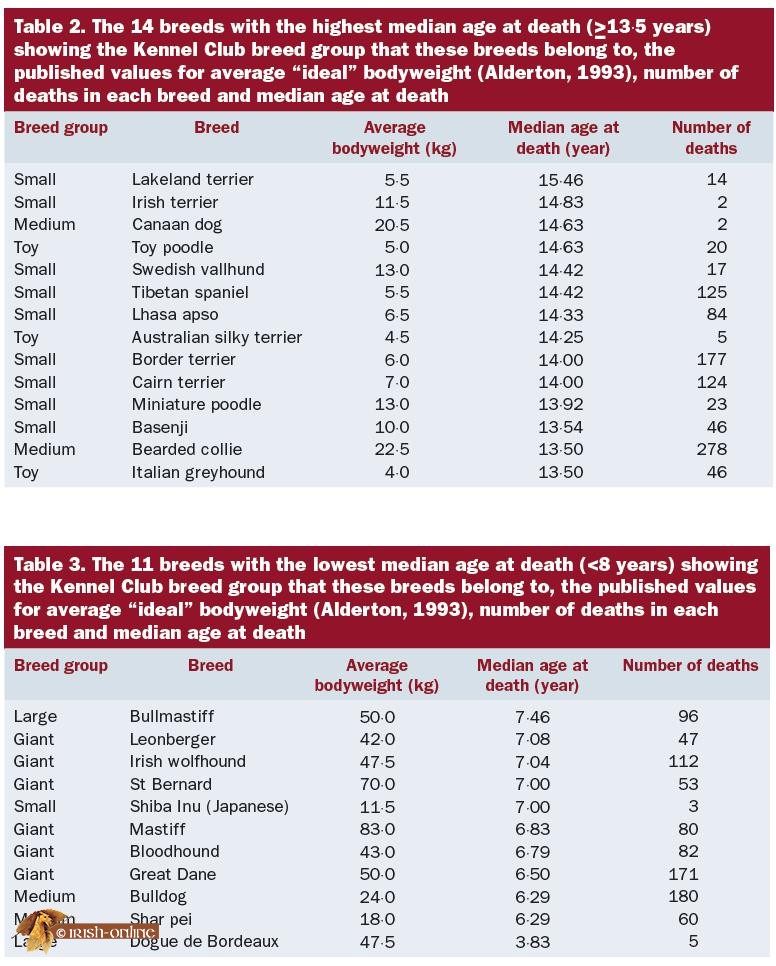Methods and mortality results of a health survey of purebred dogs in the UK
- Petra Platen
- 4.160 Mal gelesen
Liebe Leser*innen,
Irish Terrier gehören zu den gesündesten Hunderassen der Welt. Dies belegen die unter der Rubrik "Irish und Gesundheit" bisher eingestellten Artikel eindrucksvoll. Aber heißt das auch, dass Irish Terrier auch älter werden als andere Hunderassen? Eine von Grant Suneson kürzlich auf 247wallst.com zusammengefasste Studie aus dem Jahr 2010 (https://247wallst.com/special-…og-breeds-in-the-world-3/) gibt darauf eine beeindruckende Antwort: von insgesamt 165 in Großbritannien untersuchten Rassen landete der Irish Terrier auf Platz 2 der Rassen mit der höchsten Lebenserwartung: der Altersmedian lag hier bei 14.8 Jahren. Auch wenn die Rücklaufquote bei den Irish Terriern mit 7.3 % gering war und das Gesamtergebnis daher vorsichtig interpretiert werden sollte, bestätigt diese Platzierung doch die Kernaussage, dass diese Rasse zu den gesündesten der Welt zählt.
Die folgende tabellarische Übersicht zeigt die Daten der 10 Rassen mit der höchsten Lebenserwartung und der 10 Rassen mit der geringsten Lebenserwartung.

Die Originalstudie ist über folgende Webseite zu beziehen:
https://onlinelibrary.wiley.co…/j.1748-5827.2010.00974.x
Hier folgt das Abstract zur Studie:
OBJECTIVES: To collect information on the cause of death and longevity of dogs owned by members of the numerically largest breed clubs of 169 UK Kennel Club-recognised breeds.
METHODS: A cross-sectional study was carried out. Approximately 58,363 questionnaires were sent out to breed club members in 2004 (nine clubs failed to report the exact number of questionnaires sent out). Owners reported age at death and cause(s) of death for all dogs that had died within the previous 10 years.
RESULTS: A total of 13,741 questionnaires (24% response rate) containing information on 15,881 deaths were included in the analysis. Breed-specific response rates ranged from 64⋅7 to 4⋅5%. The median age at death was 11 years and 3 months (minimum=2 months, maximum=23 years and 5 months) and it varied by breed. The most common causes of death were cancer (n=4282, 27%), “old age” (n=2830, 18%) and cardiac conditions (n=1770, 11%).
CLINICAL SIGNIFICANCE: This survey shows breed differences in lifespan and causes of death, and the results support previous evidence that smaller breeds tend to have longer lifespan compared with larger breeds. Although many of the breeds in the study may not be representative of the general pedigree dog population in the UK, the results do contribute to the limited information currently available.

